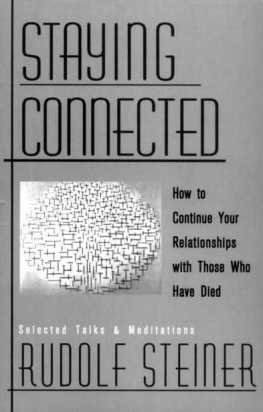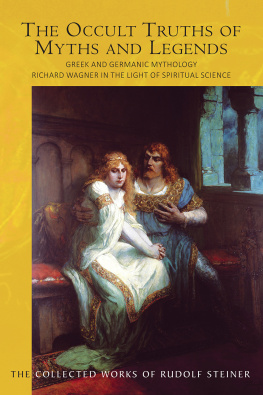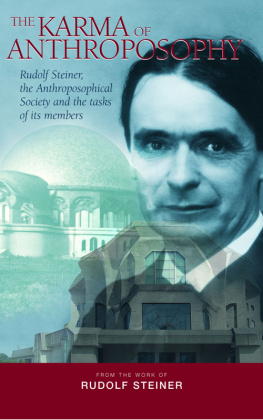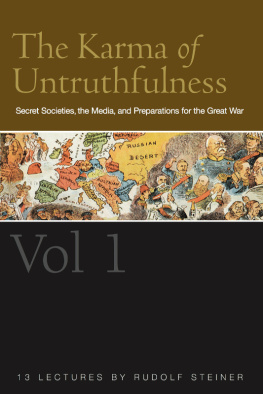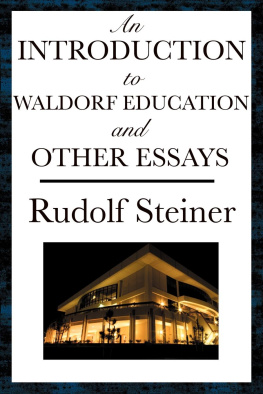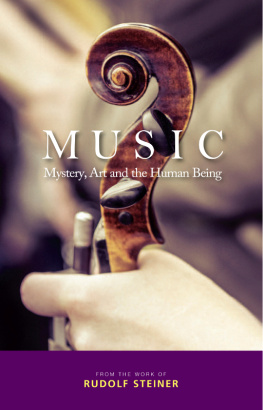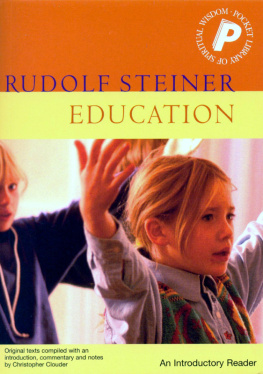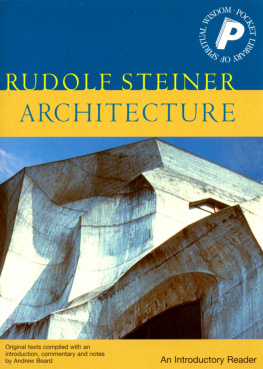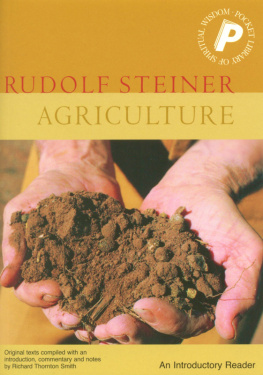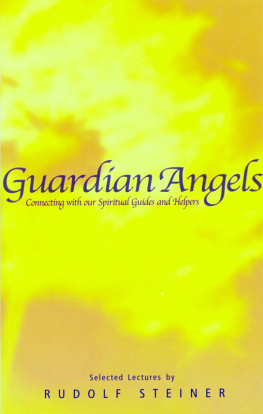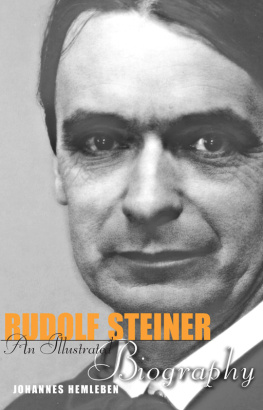Rudolf Steiner - Staying Connected : How to Continue Your Relationships With Those Who Have Died
Here you can read online Rudolf Steiner - Staying Connected : How to Continue Your Relationships With Those Who Have Died full text of the book (entire story) in english for free. Download pdf and epub, get meaning, cover and reviews about this ebook. year: 2009, genre: Science fiction / Religion. Description of the work, (preface) as well as reviews are available. Best literature library LitArk.com created for fans of good reading and offers a wide selection of genres:
Romance novel
Science fiction
Adventure
Detective
Science
History
Home and family
Prose
Art
Politics
Computer
Non-fiction
Religion
Business
Children
Humor
Choose a favorite category and find really read worthwhile books. Enjoy immersion in the world of imagination, feel the emotions of the characters or learn something new for yourself, make an fascinating discovery.
- Book:Staying Connected : How to Continue Your Relationships With Those Who Have Died
- Author:
- Genre:
- Year:2009
- Rating:5 / 5
- Favourites:Add to favourites
- Your mark:
- 100
- 1
- 2
- 3
- 4
- 5
Staying Connected : How to Continue Your Relationships With Those Who Have Died: summary, description and annotation
We offer to read an annotation, description, summary or preface (depends on what the author of the book "Staying Connected : How to Continue Your Relationships With Those Who Have Died" wrote himself). If you haven't found the necessary information about the book — write in the comments, we will try to find it.
Staying Connected : How to Continue Your Relationships With Those Who Have Died — read online for free the complete book (whole text) full work
Below is the text of the book, divided by pages. System saving the place of the last page read, allows you to conveniently read the book "Staying Connected : How to Continue Your Relationships With Those Who Have Died" online for free, without having to search again every time where you left off. Put a bookmark, and you can go to the page where you finished reading at any time.
Font size:
Interval:
Bookmark:

Continue Your Relationships with Those Who
Have Died
with Those Who Have Died
Rudolf Steiner
Selected Talks and Meditations
1905-1924
Edited and Introduced by Christopher Bamford

Part One
"Entry"
Part Two
"Practice"
Part Three
"Experience"
This is what it comes down to: that we learn to experience that those who have passed through the gate of death have only assumed another form.
Having died, they stand before our feelings like those who, through life circumstances, have traveled to distant lands, whither we can follow them only later. We have therefore nothing to bear but a time of separation.
Spiritual science must help us learn to feel and experience this in the most living way we can.
-RuDOLF STEINER, JUNE 17, 1915
Know the spiritual world! Then, among the many other blessings that humanity will gain will be this: that the living and the dead will be able to form a unity.
-RUDOLF STEINER, NOVEMBER 17, 1916
We must regain the understanding that we are not on earth just to build things in the physical universe during our physical existence. We must understand that during our whole existence we are connected to the whole world. Those who have passed through the gates of death want to work with us on the physical world. This working together only appears to be a physical collaboration, for everything physical is only an outer expression of spirit. Materialism has alienated human beings from the world of the dead. Spiritual science must help us make friends again with that world. The time must come when we no longer alienate ourselves from the dead. for it is our alienation that prevents them from spiritualizing the physical world. The dead cannot grasp things in the physical world with their hands or do physical work. To believe that would be superstition. The dead can, however, work in a spiritual way. To do so they need tools placed at their disposal; they need the spirit to live here in the physical world. We are not just human beings, we are also tools-instruments for the spirits who have passed through the gate of death. While incarnated in a physical body we use a pen, or a hammer, or an axe; but once we are no longer physically incarnate, the tools we use are human souls themselves. This has to do with the special way in which the dead perceive....
For instance, suppose you have before you a small vessel containing salt. You can see that. The salt looks like a white substance, a white powder. The fact that you see the salt as a white powder depends upon your eyes. Your spirit cannot see the salt as a white powder; but if you put a little salt on your tongue and taste its special taste, then the spirit can begin to become aware of it. Every spirit can perceive the taste of salt in you. In fact, everything that takes place in human beings through the outer world can be perceived by every spirit, including human souls who have passed through the gate of death. Within us, the sense world extends to our tasting, smelling, seeing, hearing, and so forth; the world of the dead also reaches down into what we hear, see, and taste. The dead can experience with us what we experience in the physical world. This is because these experiences belong not only to our world but also to theirs. Our experiences belong to their world when we thoroughly spiritualize what we experience in the outer world with spiritual ideas. Otherwise, what we experience as the effects of matter remains dark and incomprehensible to the dead. To the dead, a soul devoid of spirit is a dark soul. This is why the dead have become estranged from earthly life. We must overcome this estrangement. The so-called dead and the so-called living must learn again to live together inwardly....
-Rudolf Steiner, Cosmic and Human Metamorphoses
Dying touches us all deeply. We all die and so, in our ordinary lives, in the midst of the joys and sorrows we experience, in our work and play, the relations we form, and the children we have, we are continually accompanied-if not consciously then unconsciously-by our own mortality. We are reminded of this daily by loved ones we lose, friends and acquaintances who die, as well as by the myriad anonymous deaths that fill the newspapers, films, and television.
Dying is part of living. Yet, during the last few centuries, we have preferred to deny death by making it an end so final that it is unthinkable-a void, absolute negation. We thought we did so because we loved life. In fact, we did so because in our obsession with material things occupying space, we lost the ability to understand that life extends far beyond the limits of our five senses. We lost the sense that the visible world is merely the tip of an unquantifiable, qualitative, invisible reality. That is to say, we "lost" the spiritual world and, having lost it, can no longer imagine that life can take forms other than the purely physical form we have made supreme: the only reality. This was brought home to me with great intensity when, after my wife died, a friend received a spiritual vision in which my wife, living in luminous form, looked down upon the earth and said, "Love me, and live with me in the great life."
Truly, there is a great life. Life is boundless; it is greater than our wildest dreams. And we are part of it-forever. What a puny notion it is to believe that meaning and love in the universe are restricted to what we can achieve with our brain and brawn during the few brief years allotted each lifetime on earth!
On the contrary, life goes on, life continues, life is endless. We live it now. We live it every moment. This means that all life is always here, now, and that the dead, as well as the unborn-and the hierarchies of angels and Jesus Christ and Mary and all the divine beings-are always with us, seeking our participation and help in the ongoing work of God in the universe.
The implications of this are staggering. It implies that the earth we inhabit is a center of the universe and that what we do makes a profound difference in multitudes of worlds. As the cabalists say, "Every time I move my finger, an angel awakens." More startling still is the message that it sends us: "Wake up! Get real! More than your own personal enlightenment or pleasure is at stake. More depends on you than you know."
In ancient times, when humanity was less physicalized than it is today, everything spoke and every human being was a prophet, able to hear and interpret the words of the gods sounding through all phenomena. Not so much distinction was made as now between interior and exterior, subjective and objective. Heaven and earth were one world and everything was alive with meaning and calling for response. Human beings were still heavenly beings and felt themselves woven into and part of a great symphonic stream. The world, the cosmos, was music; and music was the world, the cosmos. Every plant and tree and rock, the sunlight on the water, the shape of the clouds, the dew, the wind, the flame, all feeling and intention, every smile and tear and burst of laughter, the dance of the synapses and the tremors of the inner organs-everything sang. And in this singing the voices were those of the gods and the ancestors and the elemental beings who help sustain the earth.
Font size:
Interval:
Bookmark:
Similar books «Staying Connected : How to Continue Your Relationships With Those Who Have Died»
Look at similar books to Staying Connected : How to Continue Your Relationships With Those Who Have Died. We have selected literature similar in name and meaning in the hope of providing readers with more options to find new, interesting, not yet read works.
Discussion, reviews of the book Staying Connected : How to Continue Your Relationships With Those Who Have Died and just readers' own opinions. Leave your comments, write what you think about the work, its meaning or the main characters. Specify what exactly you liked and what you didn't like, and why you think so.

